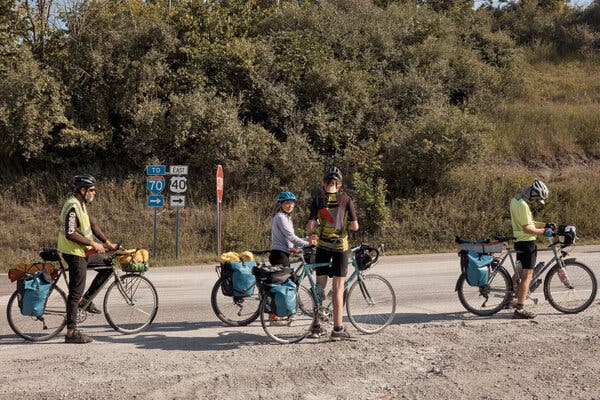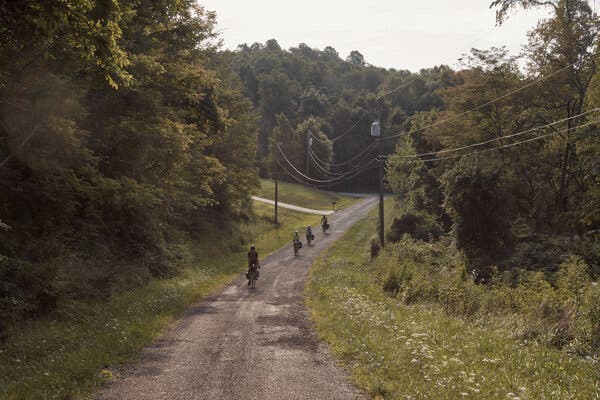
Advertisement
The romance of the open road is well established: meeting strangers, self-enlightenment, getting lost and breaking down. Would these ideals hold up in the cruel summer of 2020?

The timing was terrible for a trip like this.
On the other hand, it was perfect.
On July 1, three teenagers from San Francisco pedaled their bicycles to Ocean Beach and ceremoniously dipped their back wheels into the waters of the Pacific. With that, they pushed east, beginning a transcontinental journey that appears on course to wrap up later this month in New York.
The vague spirituality of their departure echoed the journeys of idealistic travelers across generations who have made the act of traversing the United States — on a bicycle, by foot, behind the wheel of a car — one of the evergreen sacraments of the American psyche.
The romance of the endless open road is well established: the freedom, the connection with strangers, the path to self-enlightenment, the joy and misery of getting lost and breaking down.
But would these ideals hold true in the cruel summer of 2020? Would bisecting a country in the throes of a pandemic, in a time of deep political division and a wrenching movement for social justice, yield any amount of personal transcendence? Their trip had been meticulously planned for months, but it suddenly needed to be re-evaluated when the coronavirus hit.
Even for a 3,000-mile journey, this was plenty of food for thought.
“You have a lot of time to think when you’re on your bike 10 hours a day,” Emmet Ford, 17, one of the cyclists, said on a recent day by phone somewhere in the middle of Ohio.
Ford and his companions — Julian Jordan and Dasha Yurkevich, both 18 — graduated this spring from the San Francisco High School of the Arts, in a virtual ceremony conducted over Zoom. They discussed whether the trip would put them or others in danger, whether it was appropriate to romp across America in search of adventure. Four classmates from the original group of cyclists ultimately bowed out. The remaining three elected to approach the pandemic not as an impediment, but as an opportunity.
Their lives were at crossroads, and their futures felt murkier than ever. College awaited, but in what shape or form? The lockdown sharpened their impulse to get moving. Epidemiologists were encouraging outdoors activity, after all.
“I was going to be sitting at home doing nothing,” said Yurkevich, a dancer whose summertime instruction was canceled because of the coronavirus. “What better way to spend my first summer as an adult than biking across the country?”
Accompanying them is Andy Padlo, 59, a teacher from their school, whose own post-graduation cross-country pilgrimage of self-discovery, in 1979, inspired this one.
The group packed light: a couple of outfits and a few small necessities. (Yurkevich has art supplies for nightly painting sessions.)
Meals have been gathered from gas stations and roadside restaurants. They are carrying more than 100 packs of freeze-dried miso soup. Dinner some nights might be a couple of protein bars.
Sleep has been similarly slapdash. They have camped behind a Walmart in Missouri, slept on a high school football field in Illinois and plopped down in dewy cornfields across the Midwest.
They packed hand sanitizer and masks and modified their route to avoid major cities, all in acknowledgment of the pandemic. But the virus, if only as an idea, has been inescapable.
The Coronavirus Outbreak
Sports and the Virus
Updated Aug. 14, 2020
Here’s what’s happening as the world of sports slowly comes back to life:
- The Stanley Cup playoffs in the bubble have been nastier than expected. Fighting has made a comeback, and players are hiding injuries from opponents in the same hotel.
- Lacrosse recruiting showcases have played on during the pandemic, creating tough calls for families.
- The Big Ten and Pac-12 college conferences abandoned their plans to play football this fall. But the South’s premier college football conferences have not made a decision yet.
In San Francisco, strangers yelled at them if they cycled without masks. But on the road they have encountered stores that proudly specified “masks not required” and countless people who have expressed skepticism about the virus and its risks, including developing the disease it causes, Covid-19.
“Half a dozen people have implied Covid-19 is a hoax created by the Chinese,” Jordan said.
On the 39th day of their expedition, they rolled into Indianapolis in search of a bicycle repair shop and unwittingly wandered into the middle of an anti-mask protest. There were signs denouncing the science behind the response to the pandemic and speeches espousing conspiracy theories about the government. A dozen protesters lugged assault rifles.
Ford sought a measured way to describe his reaction to the scene.
“I think a lot of people, even myself, we jump to a conclusion if we don’t educate ourselves first,” he said, pausing to think. “I’m trying to understand,” he went on. “But we were a little taken aback.”
Padlo hoped such interactions would ultimately benefit the teenagers. Face-to-face dialogues, he said, promoted understanding in a way social media could not, even if the participants never came close to agreement.
Fortunately, the road leaves time for rumination, and quiet moments have invited deep conversation.
The group members have marveled about the kindness of strangers, people who have invited them to their homes for meals or provided space in their yards to camp. But they have wondered, too, whether they would be treated the same if they were not four white middle-class people.
“It’s shaped by the color of our skin,” Jordan said about their largely positive social interactions. “If we looked a different way, things could be a lot different.”
Padlo had grasped this before. A couple decades ago, he encouraged two of his students, both of them Latino boys, to experience life on the road and cycle from San Francisco to San Diego. Midway through the journey, they were arrested after trying to camp in a field.
“They were really disappointed and felt betrayed,” Padlo said. “They’d done what I said: Find a place on the side of the road to sleep. This land is your land. I had a wake up call. Things are not that simple.”
The point was further driven home this month in Indiana, where the group was accompanied for a 50-mile stretch by a friend of a friend, a Black man, who began the day by casually pointing out which towns he would not feel safe riding through. Such concerns had never crossed the teenagers’ minds. But as they cycled into neighborhoods displaying Confederate flags, they began to understand.
Other problems have been more mundane.
Several drivers have intentionally ripped them with exhaust fumes or swerved to taunt them.
At one point, the group went 12 days without bathing. Around the sixth day into that stretch they began to realize: At least we physically can’t get any dirtier.
“If we find a creek or something there’s no holding back,” Ford said.
Their bodies have ached. They lose things. They get bored.
The sublime natural beauty of early segments like Red Canyon in Utah gave way to weeks and weeks of corn and soybean fields. Audiobooks help fill the mind-numbing hours. Ford has listened to “Animal Farm,” “Treasure Island” and “1984.” Yurkevich listened to “The Adventures of Huckleberry Finn” as they crossed the Mississippi River. Jordan listened to Michelle Obama’s autobiography, “Becoming” — twice.

The teenagers said the road had undoubtedly changed them for the better. They glimpsed a three-dimensional view of their country, clearer than the caricatures sometimes seen on television news.
“People are the same,” Yurkevich said. “People are kind, curious.”
Having almost finished this, they are wondering now what other big things they can do.
Padlo hopes these sentiments stick. He said his classmates saw their lives as an open road. His students today, he worried, see it as a closed circle.
“It seems much more impoverished in its sense of any potential realization of ones destiny,” he said. “It’s more like trying to find a secure spot.”
So he hopes the trip, one ocean to the other, will liberate them of that thinking, if only for a summer.
Once in New York, they will head to Brooklyn and touch their front tires to the waters of the Atlantic.
After that, who knows?